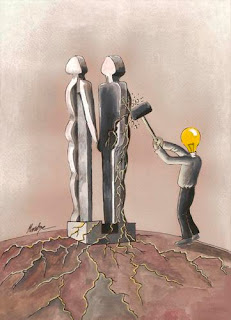How do I explain Turkey to foreigners?
(...)
But at the same time in Turkey the “Monument of Humanity” that symbolized the thawing of relationships with Armenia was being knocked down as a clear sign of Prime Minister Recep Tayyip Erdoğan’s intolerance
(...)
How do I explain Turkey to foreigners?
Monday, October 24, 2011
ORHAN KEMAL CENGİZ (*)
I am writing this on the way to France. The meetings I will attend in France demonstrate that Europe’s interest in Turkey has increased unusually. I have been invited to three meetings on Turkey in Strasbourg this week. The first meeting at Strasbourg University is on the minority situation in Turkey. The other two are a little thought-provoking: Two separate departments at the Council of Europe are discussing Turkey in detail on two separate topics in closed sessions; one of the round-table meetings is “Recent developments in Turkey” and the other “The situation of human rights activists in Turkey.”
Only two countries are being discussed in “the situation of human rights activists” meeting: Russia and Turkey. I assume it will not be possible to write about the contents of the meetings, but even the fact that Turkey and Russia are being discussed simultaneously explains a lot. After the arrests of journalists Ahmet Şık and Nedim Şener, some warnings started coming from the Council of Europe. Another factor that has put Turkey on the Council’s agenda was that the operations against the KCK, the alleged urban wing of the outlawed Kurdistan Workers’ Party, were being conducted to a quite widespread extent. The anti-terror act has to be reviewed urgently and articles that contain vague interpretations such as “those who assist the organization even though they are non-members” have to be changed.
In the international meetings, I see serious confusion about Turkey. European and American observers listen to two different Turkey stories that have nothing to do with each other from two different groups. They are certainly confused when one of these stories is on “advanced democracy” and the other is on “civilian dicta.” I have a different version of Turkey. I tried to explain this version in a few meetings with the story of one day in Turkey.
This is also my genuine view. The events that happened on the day of the last April 24 are the real photo of Turkey in my eyes.
Those two events happened in the same Turkey the same day:
In those hours when the “Monument of Humanity” in Kars was being demolished, we commemorated in five different provinces and districts the Armenian intellectuals who were taken from their homes on April 24, 1915, never to return again. I was among the handful of people who gathered at Ankara’s Sakarya Square for the commemoration. Similar gatherings were organized at the same time in Istanbul, İzmir, Diyarbakır and Bodrum.
From my point of view, the situation at Sakarya Square was a surrealist picture. While a group that calls itself “leftist” was booing us, the police, who had been obviously very carefully instructed by the government, formed a human wall between us and the counter-demonstrators. This photograph is a significant frame regarding the change and transformation Turkey is experiencing. We could not even imagine such a thing some five or 10 years ago.
But at the same time in Turkey the “Monument of Humanity” that symbolized the thawing of relationships with Armenia was being knocked down as a clear sign of Prime Minister Recep Tayyip Erdoğan’s intolerance. Moreover, this was neither the first nor the last manifestation of the prime minister’s intolerance.
The fact that those two events happen simultaneously in Turkey shows that neither “civilian dicta” nor “advanced democracy” can explain the current situation in Turkey. In a very unique way of our own, we are proceeding on a paradoxical journey. How and in which direction this journey will take us cannot be explained depending only on the government’s intentions. An opposition that would do justice to the “right-doings” of the government and criticize harshly its wrong-doings is badly needed. A significant mission is also borne by the media in this context. But, unfortunately, because the media is torn between the two camps of “advanced democracy” and “civilian dicta,” it cannot, in any way, play a guiding or encouraging role.
(*) Orhan Kemal Cengiz is a columnist for daily Radikal in which this piece appeared on Oct. 24.
It was translated into English by the Daily News staff.
www.hurriyet daily news. com
24-10-2011

